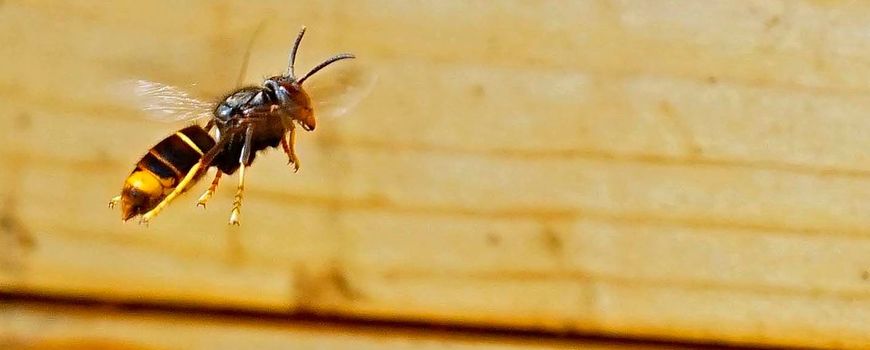Strong growth
The Asian hornet is currently mainly found south of the major rivers. More than 500 nests have been identified in 2023, more than 6,400 in Flanders. Groningen is the only province where no nest has yet been found. Every year the number of nests increases by a factor of seven, which means that the EIS Insect Knowledge Center expects no fewer than 3,700 nests for our country by 2024.
Prey choice
The Asian hornet is an opportunistic predator that mainly preys on common flies and wasps as well as honey bees. The latter is a cause of great concern among beekeepers, although the Asian hornet is not the only predator of honey bees. The bee wolf and the European hornet also hunt honey bees. Because a colony of honeybees consists of about 40,000 workers in the summer, the predation of hundreds of honeybees does not necessarily have to be a threat to the colony. The death of colonies due to predation by Asian hornets has not yet been recorded in our country and, if it occurs, will be negligible compared to major deaths from other causes. Moreover, many colonies of the Asian hornet catch few honey bees.
The most important prey of the Asian hornet are abundant wasps and flies, such as lemonade wasps, bluebottles and house flies. Hover flies are rarely caught, bumblebees, wild bees and butterflies are exceptionally caught. As would be expected from an opportunistic hunter, rare species are rarely identified as prey. The Asian hornet catches a lot of prey, but does not pose a threat to biodiversity.
Health
Multiple sting incidents can be dangerous to humans. In hornets, these actually only occur in the immediate vicinity of the nest. Because the summer nest of the Asian hornet, unlike the European hornet, is in the vast majority of cases high in treetops, the risk of such incidents is extremely small. Only in exceptional cases of low-hanging nests, for example in hedges, is there a greater risk of multiple stabbing incidents. Such nests must be cordoned off with tape. After an expert has determined that it is really an Asian hornet and not a European hornet or middle wasp, the nest can be controlled as soon as possible. In order not to burden the environment, it is important that no poison is used.
Economy
The economic damage that the Asian hornet is said to cause mainly concerns grape cultivation in Southern Europe and is poorly substantiated. Economic damage to other fruits, such as apples, pears and cherries, as well as other economic damage is negligible. The costs of control depend mainly on the chosen policy ambition and are therefore more political than economic.
Control
Various model calculations show that to reduce population density, at least 90 percent of all nests must be controlled. Even with all the innovative techniques, that is a completely unrealistic goal. Eradication is not a realistic option and that position is now also taken by the Flemish government and the province of Zeeland. We will have to learn to live with the Asian hornet.
According to all studies, the large-scale use of traps, as propagated by many beekeepers, leads to more damage to biodiversity than is prevented by trapping and should therefore be discouraged. The large-scale appeal from the public to kill the Asian hornet also leads to many unnecessary victims among European hornets and other insects, including honey bees. Combating summer nests by amateurs is potentially life-threatening and should always be discouraged. Beekeepers who are bothered by hunting Asian hornets in front of their hives have the options to transmit the hornets to locate the nest, move their hives or accept the damage.
More information
- The information in this article comes from a new study by EIS Insect Knowledge Center on behalf of the provinces of North and South Holland. If you want to know more, read the full report ‘What next for the Asian hornet?‘ (pdf: 6.3 MB).
Text: Theo Zeegers, EIS Insect Knowledge Center
Image: Theo Zeegers; Jos, Waarneming.nl


